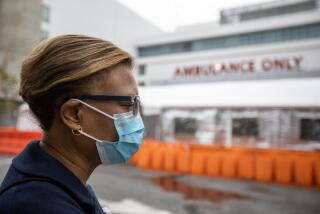King Hospital Passes Test but Key Problems Remain : Health: Much-criticized facility wins full accreditation. Confidential records, though, show chronic shortages.
- Share via
After almost flunking its review two years ago, Martin Luther King Jr./Drew Medical Center has received full accreditation from the agency that certifies care at most of the nation’s hospitals.
The hospital has made impressive gains in numerous areas of patient care, achieving the highest possible score in 28 of 50 categories, according to results of the latest inspections by the Joint Commission on Accreditation of Health Care Organizations (JCAHO).
But while county health officials are trumpeting the good news, confidential hospital records that were not reviewed by accrediting officials show that the 430-bed public hospital in Watts remains starved for resources and additional funding. Also, four of its physician training programs have been placed on probation--including emergency medicine, which was cited for lack of proper supervision by senior doctors, records show.
One internal hospital draft report that assesses patient care at King during the first quarter of this year asserts that patients are suffering and even dying because of critical staffing shortages, closed wards, a lack of intensive care beds, malfunctioning or antiquated equipment, severe crowding and a chronic lack of basic supplies.
“Serious outcomes, including deaths, have resulted from inadequate staffing levels (and) lack of availability of required diagnostic and therapeutic services,” according to the 18-page report prepared by King physicians on the hospital’s Quality Assurance Committee.
“There is documentation to support deaths due to lack of resources . . . (and) a significant number of avoidable complications.” The report forecasts “a progressive increase” in malpractice claims, “as the limitations in providing the scope and level of care . . . have resulted in undesired outcomes, which include death.”
Such reports are required as a condition of accreditation and normally are examined during inspections by the joint commission. In addition, the quarterly reports are routinely forwarded by hospital officials to the Los Angeles County Department of Health Services.
But in this case, JCAHO officials who inspected King in July did not review the critical quality assurance report that addresses patient care at King between January and March. Eugene Olea, King’s associate administrator, characterized the report as only a draft. “It was never an official document of this institution,” he said.
Olea said the report was apparently sent by mistake to county officials in June. The official at King who sent the report to top county brass--but who declined to be identified--told The Times that he did this on purpose because he feared it would otherwise never be brought to the attention of administrators in a position to effect change.
Carl Williams, assistant director of hospitals at the county health department, who received the report, said he “sent it back (to the hospital) and asked for clarification and additional documentation.”
The hospital later approved a revised version of the report, but officials declined to release it or any subsequent quarterly quality assurance reports prepared this year by King physicians. Olea said this version was made available to JCAHO officials who spot-checked hospital records during the July inspection.
JCAHO officials declined through a spokesman to be interviewed.
The Chicago-based agency granted King a full, three-year accreditation in September and noted the hospital’s greatly improved score compared to two years ago.
Touting the good news, Dr. Jonathan Weisbuch, the county’s medical director, declared: “We won. Like the Minnesota Twins who finished last in one year, and first the next, the Martin Luther King Jr./Drew Medical Center finished the process with some of the highest marks given by an accreditation team.”
Two years ago, the public spotlight was thrown on serious patient care and administrative problems at King, prompting a high-level personnel shuffle and threats by federal health officials to cut off $60 million in Medicare and Medi-Cal funding.
After state health officials cited King for widespread health code violations, JCAHO officials paid the hospital a surprise visit in October, 1989. Their discovery of severe shortcomings in the hospital’s quality assurance program and its monitoring of doctors prompted the commission staff to recommend that King’s accreditation be revoked. But commissioners voted instead to put the hospital on probation.
There has been dramatic improvement in many areas during the last two years, according to the JCAHO’s latest survey results. In its visit two years ago, the JCAHO faulted King for its minimal compliance or total lack of compliance in 17 out of 44 areas of evaluation, according to a confidential score card obtained by The Times. The worst scores were in categories such as surgery and anesthesia services, respiratory care, dietetic services and monitoring of drugs and physician competence.
All these areas showed tremendous improvement, according to the JCAHO’s latest survey results, with scores jumping from worst to best in all categories except surgery and anesthesia.
“There has been a tremendous amount of effort to improve things here,” Olea said. “I can see this hospital going in the right direction.”
Weisbuch said, “What the JCAHO is saying (to King) is not that you’re without problems, but that you have mechanisms in place to identify those problems, deal with them and reduce the occurrence of those problems in the future.”
As part of this process, doctors at King have been preparing the quarterly quality assurance reports, which have noted that good progress is being made in several areas, including peer review, monitoring of drug and antibiotic usage, and blood transfusions.
But overall, the report for the first quarter of 1991 paints a dire portrait of a hospital starved for funds and resources. “The staffing and equipment provisions are at a crisis level,” the report warned. “Most critical procedures cannot be performed in a timely manner. Those that can be performed must frequently be repeated because of equipment failure or malfunctions.”
In some areas--such as the hospital’s infection control program--the progress that has been made could well be reversed, doctors warned, by insufficient housekeeping personnel and a shortage of basic supplies such as scrub suits for doctors and isolation gowns for patients.
Services throughout the hospital, the report said, have been overwhelmed by heavy patient loads that have “grossly exceeded initial projections.”
Nowhere is the crunch more evident than in the hospital’s emergency room and trauma center--the point of entry for most of the hospital’s patients.
For lack of adequate space, staff and beds, patients must wait in King’s emergency department for up to three days for admission to the hospital bed, according to findings of the Accreditation Council for Graduate Medical Education (ACGME).
Two days after the JCAHO notified King of its full accreditation in September, the ACGME told the hospital that its residency program, which trains young physicians in emergency medicine, will remain on probation, despite an appeal by hospital officials for full certification. In addition to finding inadequate patient care space, equipment and program support in the emergency department, the ACGME faulted the hospital for “seriously insufficient” faculty supervision of the emergency room.
In addition to emergency medicine, three other major speciality residency training programs at King have been placed on probation: obstetrics, pediatrics, and medicine.
Without these vital training programs, the hospital would be unable to attract physician trainees, who provide the hospital with the bulk of its medical manpower.
More to Read
Sign up for Essential California
The most important California stories and recommendations in your inbox every morning.
You may occasionally receive promotional content from the Los Angeles Times.













